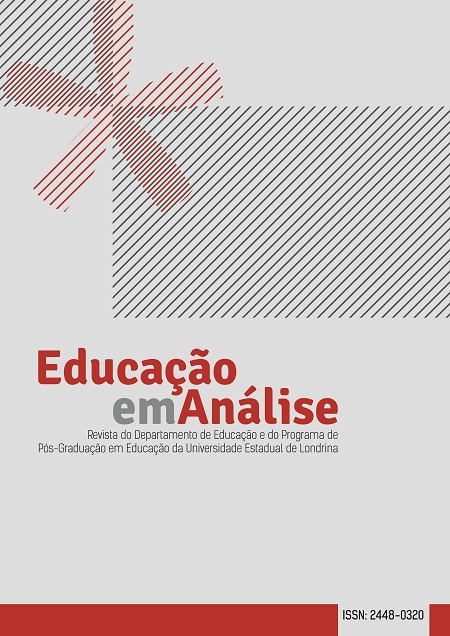The self-efficacy belief of trainees from a pedagogy course regarding professional practice
DOI:
https://doi.org/10.5433/1984-7939.2016v1n2p215Keywords:
Social cognitive theory, Self-efficacy belief, Higher education, Pedagogy, Professional practiceAbstract
This work is based on the Social Cognitive Theory, more specifically regarding the construct of self-efficacy beliefs, defined as the judgment of people regarding their capacities to organize and execute necessary courses of action to reach some kinds of performance. Its general objective was analyzing the self-efficacy belief of students from the last year of the Education Course from a Public Institution regarding the professional practice, and its specific objectives were comparing the level of self-efficacy of the students regarding professional practice and the period when the course was offered and analyzing the items Career Decision and Professional Self-Efficacyof the students in separate. Seventy-six academic trainees, registered in both morning and evening periods from a Public University, took part in the research. Data collection was performed by means of a sociodemographic questionnaire. This is a Likert type scale, of five points, having questions regarding Career Decision and Self-efficacy Belief. In general, data analysis evidenced that the trainees had a moderate level of belief. However, both the ones who took part in complementary academic activities and who worked in Education area had higher scores regarding the others. Probably, the participation in those activities promoted a positive domain experience, from the acquired knowledge and the established theory practice relationship. Thus, it is highlighted the importance of the collegiality and professors of the course to encourage the participation of students in those activities, to lead future teachers to develop a positive belief regarding professional practice.Downloads
References
AZZI, Roberta Gurgel; POLYDORO, Soely Aparecida Jorge; BZUNECK, José Aloyseo. Considerações sobre a autoâ€eficácia docente. In: AZZI, Roberta Gurgel; POLYDORO, Soely Aparecida Jorge (Org.). Autoâ€eficácia em diferentes contextos. Campinas: Alínea, 2006. p. 149â€159.
BANDURA, Albert. O sistema self no determinismo recíproco. In: BANDURA, Albert; AZZI, Roberta Gurgel; POLYDORO, Soely. Teoria social cognitiva: conceitos básicos. Porto Alegre: Artmed, 2008. p. 43â€67.
BARDAGI, Marucia Patta; BOFF, Raquel de Mello. Autoconceito, autoâ€eficácia profissional e comportamento exploratório em universitários concluintes. Avaliação, Sorocaba, v. 15, n. 1, mar. 2010. Disponível em: http://www.scielo.br/pdf/aval/. Acesso em: 7 jan. 2015.
BZUNECK, José Aloyseo. As crenças de autoâ€eficácia e o seu papel na motivação do aluno. In: BORUCHOVITCH, Evely; BZUNECK, José Aloyseo (Org.). A motivação do aluno: contribuições da psicologia contemporânea. 3. ed. Rio de Janeiro: Vozes, 2001. p. 116â€133.
CERUTTI, Fernanda et al. Autoeficácia entre estudantes universitários ingressantes e veteranos de dois cursos. Ciências & Cognição, Rio de Janeiro, v. 16, n. 3, p. 57â€65, 2011. Disponível em: http://www.cienciasecognicao.org/revista/ index.php/cec/article/view/745/514. Acesso em: 7 jan. 2014.
FERREIRA, Marco Antonio Cabral. A influência da autoâ€eficácia e da ansiedade em jogadores de futebol. 2008. Dissertação (Mestrado Departamento de Educação Física) †Universidade Federal do Paraná, Curitiba, 2008.
FONTES, Arlete Portella; AZZI, Roberta Gurgel. Crenças de autoeficácia e resiliência: apontamentos da literatura sociocognitiva. Estudos de Psicologia, Campinas, v. 29, n. 1, p. 105â€114. jan./mar. 2012.
GHEDIN, Evandro; LEITE, Yoshie Ussami Ferrari; ALMEIDA, Maria Isabel de. Formação de professores: caminhos e descaminhos da prática. Brasília: Liber Livro, 2008.
GLASER, Sheila Lauffer. Relações entre habilidades sociais, autoâ€eficácia e decisão de carreira em universitários em final de curso. 2010. 32 f. Monografia (Especialização em Psicologia Clínica) †Instituto de Psicologia, Universidade Federal do Rio Grande do Sul, Porto Alegre, 2010.
GUERREIROâ€CASANOVA, Daniela Couto; POLYDORO, Soely Aparecida Jorge. Autoeficácia na formação superior: percepções durante o primeiro ano de graduação. Psicologia, Ciência e Profissão, Campinas, v. 31, n. 1, p. 50â€65, 2011. Disponível em: http://www.scielo.br/pdf/pcp/v31n1/v31n1a06.pdf. Acesso em: 1 dez. 2014.
IAOCHITE, Roberto Tadeu et al. Autoeficácia docente, satisfação, e disposição para continuar na docência por professores de educação física. Revista Brasileira de Ciência do Esporte, Florianópolis, v. 33, n. 4, p. 825â€839, out./dez. 2011.
IMBERNÓN, Francisco. Formação docente profissional: formarâ€se para a mudança e a incerteza. 3. ed. São Paulo, Cortez, 2002.
MOGNON, Jocemara Ferreira; SANTOS, Acácia Aparecida Angeli. Vida acadêmica e exploração vocacional em universitários formandos: relações e diferenças. Estudos e Pesquisas em Psicologia, Rio de Janeiro, v. 14, n. 1, p. 89â€106, 2014. Disponível em: http://www.eâ€publicacoes.uerj.br/index.php/ revispsi/article/view/10481/8253. Acesso em: 9 jan. 2015.
OURIQUE, Luciana Rubensan. Autoâ€eficácia e personalidade no planejamento de carreira de universitários. 2010. 84 f. Dissertação (Mestrado em Psicologia) - Universidade Federal do Rio Grande do Sul, Porto Alegre, 2010.
PAJARES, Frank; OLAZ, Fabian. Teoria social cognitiva e autoâ€eficácia uma visão geral. In: BANDURA, Albert; AZZi, Roberta Gurgel; POLYDORO, Soely. Teoria social cognitiva: conceitos básicos. Porto alegre: Artmed, 2008. p. 97â€114.
PEREIRA, Ana Lúcia; ZUPPANI, Tatiani dos Santos; GONÇALVES, Marcelo Neves. Crenças de autoeficácia e carreira de estudantes de administração. Atos de Pesquisa em Educação, Blumenau, v. 9, n. 2, p. 535â€547, maio/ago. 2014. Disponível em: http://proxy.furb.br/ojs/index.php/atosdepesquisa/. Acesso em: 6 mar. 2015.
ROCHA, Márcia Santos. A autoâ€eficácia docente no ensino superior. 2009. Tese (Doutorado em Psicologia Educacional) †Universidade Estadual de Campinas, Campinas, 2009.
SILVA, Afonsa Janaína da; IAOCHITE, Roberto Tadeu; AZZI, Roberta Gurgel. Crenças de autoeficácia de licenciandos em educação física. Motriz: Revista de Educação Física, Rio Claro, v. 16, n. 4, p. 942â€949, out./dez. 2010.
SOUSA, Heloiza de; BARDAGI, Marucia Patta; NUNES, Carlos Henrique Sancineto da Silva. Autoeficácia na formação superior e vivências de universitários cotistas e não cotistas. Avaliação Psicológica, Florianópolis, v. 12, n. 2, p. 253â€261, 2013.
SOUZA, Liliane Ferreira Neves Inglez; BRITO, Márcia Regina Ferreira. Crenças de auto†eficácia, autoconceito e desempenho em matemática. Estudos de Psicologia, Campinas, v. 25, n. 2, p. 193â€201, 2008.
TEIXEIRA, Marco Antônio Pereira; GOMES, William B. Decisão de carreira entre universitários em fim de curso universitário. Psicologia: Teoria e Pesquisa, Santa Maria, v. 21, n. 3, p. 327â€334, set./dez. 2005.
UNIVERSIDADE ESTADUAL DE LONDRINA. Centro de Educação Comunicação e Artes. Curso de pedagogia. Disponível em: http://www.uel.br/ceca/pedagogia/. Acesso em: 3 mar. 2015.
VIEIRA, Diana; COIMBRA, Joaquim Luís. A autoâ€eficácia na transição para o trabalho. In: AZZI, Roberta Gurgel; POLYDORO, Soely Aparecida Jorge (Org.). Autoâ€eficácia em diferentes contextos. Campinas: Alínea, 2006. p. 25â€58.
Downloads
Published
How to Cite
Issue
Section
License
Copyright (c) 2016 Educação em Análise

This work is licensed under a Creative Commons Attribution 4.0 International License.
Os artigos publicados na Revista Educação em Análise estão sob a Licença Creative Commons Atribuição 4.0 Internacional, garantindo Acesso Aberto. Deste modo, os autores mantêm os direitos autorais de seus trabalhos e, em caso de republicação, solicita-se que indiquem a primeira publicação nesta revista. Essa licença permite que qualquer pessoa leia, baixe, copie e compartilhe o conteúdo, desde que a devida citação seja feita. Além disso, autoriza a redistribuição, adaptação e criação de obras derivadas em qualquer formato ou meio, incluindo uso comercial, desde que a atribuição à revista seja mantida.
A revista se reserva o direito de efetuar, nos originais, alterações de ordem normativa, ortográfica e gramatical, com vistas a manter o padrão culto da língua e a credibilidade do veículo. Respeitará, no entanto, o estilo de escrever dos autores. Alterações, correções ou sugestões de ordem conceitual serão encaminhadas aos autores, quando necessário.
As opiniões emitidas pelos autores dos artigos são de sua exclusiva responsabilidade.
























